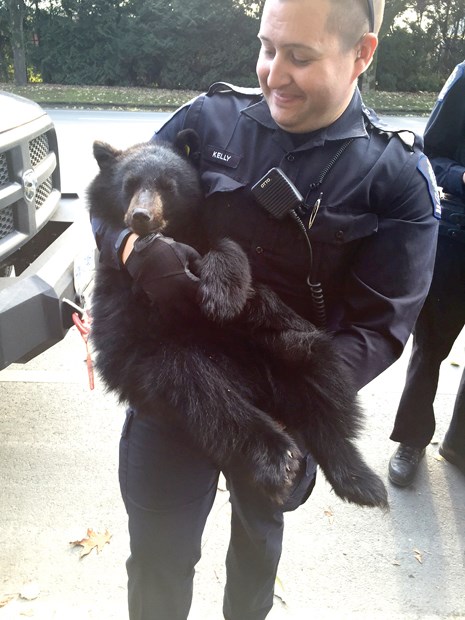A tiny black bear cub spotted wandering alone around the Lynn Creek area of North Vancouver was tranquilized by a conservation officer and taken to the Critter Care animal rehabilitation centre in Langley on Sunday.
The female cub, which weighed only 22 pounds, is the first black bear sent to the animal rehab centre from the North Shore this year.
The fate of the cub was much happier than that of two other bear cubs shot by conservation officers in the British Properties earlier this month.
Those cubs and their mother were shot after the three bears were deemed by conservation officers as too habituated to human food and involved in too many conflicts with people to be prospects for rehabilitation.
Christine Miller, spokeswoman for the North Shore Black Bear Society, said the latest cub was first spotted around Oct. 16 behind Lynnmour elementary. The cub was spotted again several times in the neighbourhood over the next 10 days, she said.
Conservation officers managed to tree and tranquilize the cub near Park & Tilford Gardens on Sunday.
“The cub was very small,” said Miller. “It just looked teeny.”
Colin Bridge happened to be in the area when the drama unfolded and caught a glimpse of the tranquilized bear cub lying in the back of the conservation officer’s truck. At first, Bridge said he was afraid the cub had been destroyed. But when he got closer, “I could see it breathing,” he said. “I thought ‘Holy cow, that’s fantastic.’”
Miller said nobody knows what happened to the cub’s mother. Normally, black bears stay with their mothers until they are about 18 months old.
The same day, Sunday, a second orphaned bear cub that had been spotted around a residential area of Squamish was also captured by conservation officers and taken to Critter Care.
Simon Gravel, conservation officer in the West Vancouver-Sea to Sky corridor, said both bears fit the criteria for successful rehabilitation – they had not become habituated to human food sources, hadn’t been in conflict with people and were in healthy condition.
Gravel said conservation officers follow provincial policy set by wildlife biologists and other experts when deciding what to do with orphaned bear cubs.
Since 2007, conservation officers had been taking all orphaned bear cubs to the rehabilitation facility, which releases them back into the wild. But Gravel said last year, conservation officers were told to start assessing bear cubs by the existing provincial policy.
That means cubs will usually be shot if they have been entering occupied homes or garages or have been learning to access human food sources from their mother over an extended period of time.
Miller said the change is concerning to animal advocates, who feel cubs of sows that have been in conflict with people can still be rehabilitated and released.
“I don’t know how habituated a cub can be,” she said.
Miller said she’s hoping the provincial policy about bear cubs will be changed.
Gravel said one young “conflict” bear shot by conservation officers in Whistler this summer had been released in the spring from Critter Care after getting into a house the year before.
Gravel said if cubs can be caught before they get into trouble with people they stand a better chance. “Often we get the call when the bears are at a very high level of conflict,” he said.
This time of year it’s especially important to store attractants like bird feeders and store garbage indoors until pick-up, he said.
“It’s a very critical time for bears. They need to eat a lot before the winter.”



